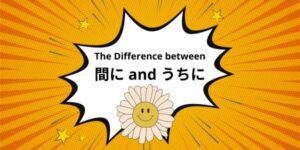The Problem
間に and うちに both mean “while” or “during.” Sometimes they are interchangeable; sometimes they are not. Sometimes they are interchangeable but have a slightly different nuance. In today’s lesson, we’ll look at when to use which and present a number of example sentences.
Makoto+ Members, click here to download all the sound files and PDF for this lesson. Practice makes perfect!
Vocabulary
Both words are followed by the に particle. Let’s first look at the core words:
Surely the kanji is 内 (within; inside)
but usually written in kana.
Comparison
Similarities
- Both mean “while” or “during”.
- Both imply a linear concept of time with a beginning and end.
When to use うちに
- うちに is used with less certain time periods (the beginning and end aren’t clear or aren’t too important).
近いうちにまた話しましょう。
Let’s talk again in the near future.
[The time frame is ambiguous.]
Vocabulary & Notes
- うちに might imply a sense of urgency in that the desired action may not be possible (or ideal) after the condition ends.
あついうちにお茶を飲んでください。
Please drink your tea while it's hot.
[There is a sense of urgency to enjoy the tea while it is still hot.]
Vocabulary
若いうちに海外に行きたい。
While I’m still young, I’d like to go overseas.
Vocabulary
- In short, use うちに when the time period isn’t very clear & there is a sense of urgency to do the action before the state changes. Once the state changes, the action can't be done.
When to use 間に
- 間に is used when the time frame is clear or when the speaker wants to emphasize the timing.
- It focuses on the idea that two or more events or states are occurring concurrently. When one thing is happening, something else is also happening.
8時と10時の間に来てください。
Please come between 8 and 10.
[うちに wouldn’t work here because the timing is precise.]
Vocabulary
- In short, use 間に when there is a time frame that has a beginning and end, especially when the time frame is clear or the speaker wishes to emphasize the time frame. It expresses things that are happening at the same time.
Examples
日本にいるうちに一度京都に行きたい。
日本にいる間に一度京都に行きたい。
うちに or 間に Both Okay
While in Japan, I’d like to go to Kyoto once.
[うちに emphasizes the time crunch (a visit to Kyoto can’t occur after one leaves Japan) while 間に simply states the fact]
Vocabulary
外が明るいうちにバスケットをしましょう。
外が明るい間にバスケットをしましょう。
うちに or 間に
While it’s still bright out, let’s play basketball.
Vocabulary
気付かないうちに外が暗くなった。
Before I realized it (while I was unaware), it got dark out.
[間に wouldn’t work because there isn’t a beginning.]
Vocabulary
一時から二時の間に買い物に行きました。
I went shopping between 1 and 2.
[うちに wouldn’t work due to the clear time frame]
Vocabulary
These two expressions are often used interchangeably, and depending on the specific context, their differences may not be very important. But to sum up the differences:
間に
- clear time frame
- generally “while”
うちに
- do something before the state changes
- implies a sense of urgency
- ambigious time frame
間に is the most versitile, but there are also situations where only うちに is appropriate, especially when the exact timing of a state change is uncertain. As mentioned earlier, あついうちにお茶を飲んでください。 (Please drink the tea while it's hot.) uses "うちに" because it's uncertain when the tea will cool down.
Makoto+ Members, click here to download all the sound files and PDF for this lesson. Practice makes perfect!







Thanks that you picked this up. I think, a better translation for うちに is “as long as” instead of “while”.
The time frame is the standard explantion, but I always felt that it lacked something very important until I found a comment on StackExchange where it said: “間に implies parallel timeline, and switching the contxt between them or describe the synchronous nature of events between the two timelines. While something is happening, something else is also happening, whereas うちに implies single timeline, in which “until” condition exists.”
In other words:
* Coincidence: If the main and subordinate clauses (only) occur simultaneously, then we can use 間に.
* Correlation: If the main clause depends on the situation that the subordinate clause describes, then we use うちに.
In reality, this is not a question with two answers but a spectrum where the subordinate clause goes more into coincidence or correlation, so both are often interchangeable, giving the situation a slightly different note.
I love the name of your website. 🙂 You always have a better head for these sorts of things. I made a few edits based on your comments.
Maybe this sums it up?: 間に is used to indicate that something occurs while another event is happening, and うちに is used to express that something happens before a particular condition or situation changes.
Yes, that sounds good to me.
That was great. I never understood the differences between these two words before! Thank you for the examples.
Great! Glad you liked it. Someone (Florian-san) suggested this on Instagram, I think. Let me know if you have other ideas for this kind of content.